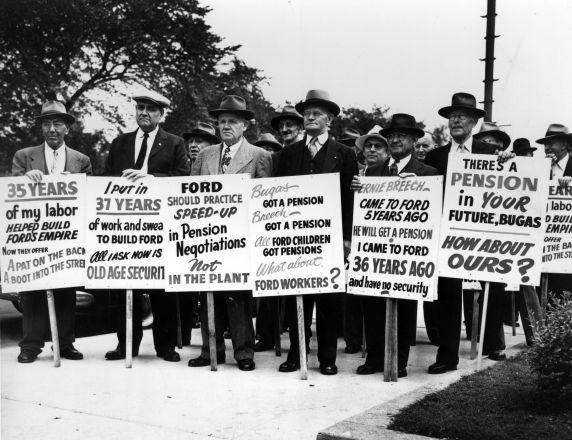Luke Pretz
Posted October 19, 2023

One of the major demands being made by the UAW membership in this round of bargaining is the restoration of defined-benefit pension plans that would provide retirees with a guaranteed stream of income. The restoration of pensions would be a massive win that would drastically improve the lives of workers, help reorient the U.S. labor movement towards a more militant approach, and build momentum for new organizing at nonunion plants, concentrated in the U.S. South.
Some history
The UAW first won pension benefits for its members through a long process of struggle and negotiation following the end of the Second World War. Seeing that the U.S. government would not ensure the wellbeing of the working class through the establishment of social-democratic programs, as in Europe, Walter Reuther and other leaders and members of the UAW developed what they saw as an alternative strategy. They sought to establish a baseline level of pay and benefits for the working class as a whole by winning contracts in the auto industry that would set the standard for other workers in the U.S. Reuther and others saw winning company-funded pensions and healthcare as a key part of that strategy.
UAW members first won pensions as part of their contract at Ford in 1949, as a result of Ford giving in to avoid a strike. The pension was negotiated as a supplement on top of existing Social Security benefits, guaranteeing at least $100 per month to any retiree who was 65 years or older and had worked at least 30 years for Ford. In doing so, the union also established three important principles:
- The pension fund would be equally administered by the union and the company
- The cost of the pension would be paid entirely by Ford
- Benefits would be guaranteed through an actuarially sound fund
Shortly after, workers at GM and Chrysler would take action and win pensions for their shops as well. Notably, GM would win a graduated pension system, in which benefits would accrue to workers as they worked at GM, not just if they made it to 30 years. The wins by workers were accompanied by concessions, most importantly reduction in the frequency of strikes and other forms of labor action, which gave the company control of the shop floor.
The pension and other benefit gains would be improved upon until 1970 and then rolled back, as neoliberal attack on workers increasingly took hold in the U.S. in the 1980s, and union leaders turned from strikes to concessions. Since the 2003 contracts, retirees have not seen an increase in pension benefits, meaning that the income they counted on to sustain themselves in retirement has been eroded by inflation.
Moreover, following the bankruptcy (GM, Chrysler) or near-bankruptcy (Ford) and bailout of the Detroit Three automakers negotiated by the Obama administration in 2009, autoworkers hired after 2007 no longer get a pension. Instead, they get contributions to a 401(k)-style retirement plan, placing their retirement savings at the whims of financial markets.
Pensions vs 401(k)s
Understanding what’s at stake in the fight to restore defined-benefit pensions requires understanding the difference between traditional pension plans and 401(k)-style retirement accounts.
Defined-benefit pension plans are retirement programs where employers promise to pay out a specific benefit for life, beginning at an employee’s retirement. The size of the benefit received by the retiree is specific to each employer. Generally speaking, they are determined by things like years of employment, past wage levels, and cost of living allowance (COLA).
401(k)s are a specific type of employer-sponsored retirement account defined by the U.S. tax code. Employees, employers, or both make contributions to the account that are not taxed until the funds are withdrawn. The UAW auto contracts replace defined-benefit pensions with 401(k)-style accounts for workers hired after 2007. The employers contribute 6.4 percent of the employee’s eligible wages to the employee’s retirement account.
A key difference between the two programs is who bears the financial risk of the fund. In the case of the defined-benefit pension plan, employers are on the hook, as they are obliged to pay retirees a specific amount in the future.
This is in contrast to the 401(k) retirement plan approach, which only requires that the employer make the contributions it said it would. If financial markets tank, wiping out the savings in the 401(k) account, the retiree must either subsist on Social Security benefits or go back to work.
The 401(k) approach to funding retirement represents a return to the early 20th century, where retirees’ quality of life was contingent on their individual savings and their family’s ability to support them.
Auto manufacturers’ argument against pensions
Ultimately, the auto manufacturers object to pensions on the grounds that they reduce their own profitability. Funds would be committed to ensuring retirees’ pension benefits, rather than investment in new buildings and equipment to expand productive capacity or returns to stockholders and management.
The Detroit Three argue that with lower profits they would lose their competitive edge with other auto manufacturers. Workers would lose their jobs, unless they allow themselves to be more intensely exploited.
In reality, however, the Big Three have leveraged their profits against workers through outsourcing and building domestic manufacturing plants in the U.S. South, where labor protection and organization are at their weakest.
In addition to profitability, the Detroit Three complain that by being on the hook for post-retirement wages they are bearing a significant amount of risk. They argue that there is significant uncertainty built into pensions regarding how long workers will live after they retire and whether there will be a financial crisis that will cause the pension fund to become insolvent.
By making this argument, Ford, GM, and Stellantis are saying that they believe workers, not the company, are the ones that should bear the risk. They are saying that, even though workers have had their bodies worn down and their future health leveraged for the gain of their employers, it is unfair to expect that the companies would take care of their employees once they were done with them.
Other arguments coming from the media
In addition to the arguments about the financial burden of pensions, some in the media like National Public Radio (NPR) have been advancing other arguments against ensuring that companies take care of their retirees.
The first is that pensions are risky because they are contingent on companies being good stewards of the pension fund and the continued solvency of the company. If a company mismanages the pension fund or goes into bankruptcy, the pension you were expecting no longer exists or exists as a much smaller amount.
It is true that any set of assets tied to financial markets comes with some risk, but to reject pensions in favor of individualizing the risk and placing it on the shoulders of workers is bogus. Moreover, it points to a simple solution: fully funded pension programs with greater regulatory oversight, under the control of the workers whose benefits are at stake.
The second objection brought forward in the media is that workers no longer have lifetime jobs at a single firm, as they used to. So, even if pensions were won, if existing employment patterns continue, they wouldn’t be particularly beneficial to workers who weren’t planning on spending their lives at a single company.
This objection raises an important question for socialists and the labor movement: How do we respond to the changes in how employment is structured in the 21st century? Patterns of employment have shifted, and the expectation that a person would work at a single company for the duration of their working lives has diminished.
Part of this story is that as pension and other employment benefits have been eroded over the last 40 years, the reason to stay at one job has also been eroded. Moreover, as capital has become increasingly easy to move from one place to another, and as financialization has made the purchase, sale, and bankruptcy of businesses more frequent, the likelihood of staying at one firm for your whole working life, even if you wanted to, has been reduced.
A key demand
The restoration of pensions, the elimination of tiers, and substantive increases in wages would certainly create an incentive for workers to stay at a company for the long haul, but it would not correct for the fact that jobs are much more precarious and prone to change than they were in the 20th century. Moreover, those pensions would still be tied to the overall health and wellbeing of capitalism via financial markets.
This is not a reason to oppose pensions as a key demand. UAW workers, like all workers, deserve a comfortable and secure retirement after committing their time, energy, and bodies to a company.
Additionally, the UAW winning the restoration of pensions for its members would signal to others in the labor movement that breaking with the collaborationist stance of business unionism in favor of a militant stance can lead to big wins. Moreover, big wins are part of what it would take for the UAW to convince unorganized workers in the South that it is in their interest to unionize, which would help workers everywhere.
The limitation of the best of pensions points to the need for the labor movement to demand a decoupling of retirement from work and work tenure. In the near term, this means demanding a fully funded Social Security program that guarantees all people a comfortable and stable income in the later years of their lives.
From a socialist perspective, such social-welfare programs are still insufficient, because they are contingent on the continued existence of capitalist exploitation and unfreedom. Moreover, as the last 40 years have shown. even the countries with the most robust social-welfare programs have begun to claw them back to preserve capitalist profitably.
Pensions are a key demand, but only a start.

